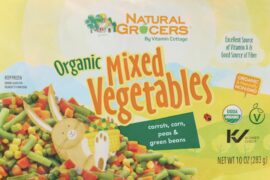Frozen corn and possibly other frozen vegetables are the likely source of an outbreak of Listeria monocytogenes that has been affecting Austria, Denmark, Finland, Sweden and the United Kingdom since 2015, according to the European Food Safety Authority (EFSA).
 Experts used whole genome sequencing to identify the food source, which initially was thought to be limited to frozen corn packed in Poland and processed and produced in Hungary. As of June 8, 2018, 47 cases including nine deaths have been reported.
Experts used whole genome sequencing to identify the food source, which initially was thought to be limited to frozen corn packed in Poland and processed and produced in Hungary. As of June 8, 2018, 47 cases including nine deaths have been reported.
The same strains of L. monocytogenes have been detected in frozen vegetables produced by a single Hungarian company in 2016, 2017 and 2018. EFSA says that this suggests that the strains have persisted in the processing plant despite the cleaning and disinfection procedures that were carried out.
Available information confirms the contamination at the Hungarian plant, according to EFSA. However, further investigations, including thorough sampling and testing, are needed to identify the exact points of environmental contamination at the factory. The same recommendation applies to other companies belonging to the same commercial group if environmental contamination is detected.
On June 29 the Hungarian Food Chain Safety Office banned the marketing of all frozen vegetable and frozen mixed vegetable products produced by the affected plant between August 2016 and June 2018, and ordered their immediate withdrawal and recall. This last measure is aimed at significantly reducing the risk of human infections and containing the outbreak. All freezing activity at the plant has been stopped.
New cases could still emerge due to the long incubation period of listeriosis (up to 70 days), the long shelf life of frozen corn products, and the consumption of frozen corn bought before the recalls and eaten without being cooked properly.
To reduce the risk of infection, consumers should thoroughly cook non ready-to-eat frozen vegetables, even though these products are commonly consumed without cooking in salads and smoothies. This applies especially to consumers at highest risk of contracting listeriosis – such as the elderly, pregnant women, babies and adults with weakened immune systems.





